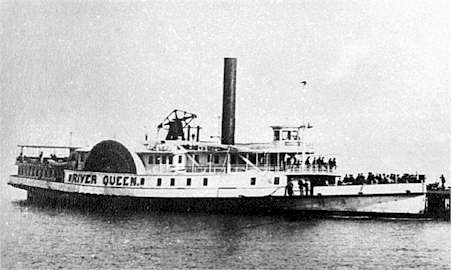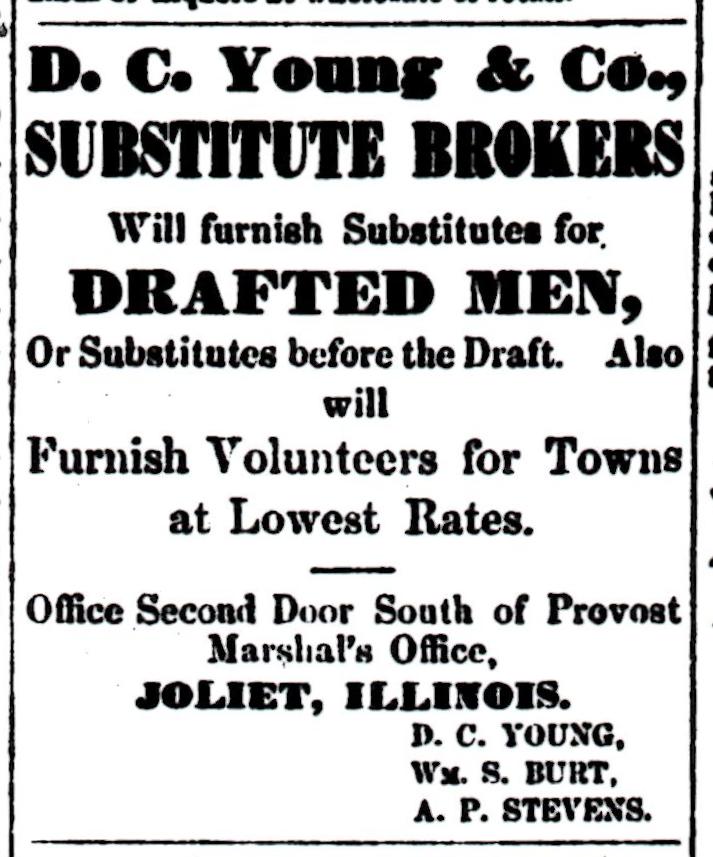Civil War: 1865 brought turmoil on the home front

By Sandy Vasko
All the signs were good. It truly seemed like the North was prevailing. Those at home believed that it could not last much longer.
But the four-year struggle had taken its toll. Many had been killed. Many had been seriously injured. More men were needed to “finish them off.” But why should anyone volunteer when it was obvious that the war was winding down? The solution to the problem was the draft.
It had already been a cold winter in Will County. The ice houses were rapidly filling up. Business was brisk with no food shortages or other nasty problems such as those rebels in the South were experiencing.
In Wilmington, the Wilmington Eating Saloon on Water Street advertised, “Oysters in every style, sardines, lobsters and meats served to order. Also choice wines, liquors and cigars.” The Ruby Saloon down the street bragged, “Fresh oysters, delivered every day.”
Compared to the life of a soldier, life on the home front was down-right cushy. And that was the problem. More men were needed and now; the government would not wait. Meetings were held all over Will County to address the problem.
An account of the Wilmington meeting in the January 18, 1865 Wilmington Independent said, “It was unanimously resolved that the quota of Wilmington should immediately be filled, and that the expense of procuring men for that purpose should be paid by voluntary contributions, the subscriber to be reimbursed from taxes to be collected on the real and personal property of the town. The sum of $4,500 ($91,100) was immediately subscribed.”
Next to that same article was an ad for D.C. Young & Co., substitute brokers. This company made money by supplying volunteers to towns in individuals at “the lowest rate.” Who were these substitutes that would lay their life down for another man for money? The answer is, many of them were con-men who had no intention of every putting on a uniform.
That was made clear when a group of them jumped bail. We read in the January 1865: “On Wednesday night last, twelve substitutes made their escape from Joliet by overpowering the guard. Two of them were arrested on Thursday, four of them on Friday, and one since, making seven in all.
“The officers have track of some others, and there is a prospect of capturing them. A farmer arrested one of the villains in the upper part of the county, and started to take him to Joliet, but while on the way down, the deserter bribed him with $150, and left.
“Officer Robinson hearing of the matter, pursued and arrested both farmer and substitute the same day. Both were taken to Joliet. What will be done with the rascal, who thus allowed himself to be bribed, remains to be seen. The deserters, of course, have been sent to Springfield in irons.”
Another business that sprang up during that time was the War Claim Agency. This was a quasi-governmental agency that helped civilians get compensation from the federal government for their losses associated with the war.
The announcement on January 25th reads, “We direct the attention of all interested to the ad of J. M. Brown who has located himself at Joliet and has an office in the Court House. He is now ready to present all claims against the government, for lost property, bounties, etc. He has an appointment by the Court to obtain evidence to prove the claims of re-enlisted Veterans who have been credited to this County since 1863, and occupies a position which enables him to do justice to all classes.”
What was not mentioned was the Mr. Brown was a private citizen and took his cut off the top of every claim that was approved.
And what of the men on the front? The 39th and 100th had gone into winter camp and had very little real fighting to do. The 20th was not so lucky. They were with General Sherman whose march to the sea had been so devastating to the South. Now he was on the move again, heading north through the Carolinas.
On January 4, they took a boat from Savannah, Georgia, to Beaufort, South Carolina. On January 13, they were on the march northward. On January 15, 1865, they captured Pocotaligo, South Carolina, and there they camped until January 30, 1865.
On February 3, 1865, President Abraham Lincoln and Secretary of State William Seward met representatives of the Confederacy aboard the steamship River Queen docked at Hampton Road, Virginia, near Fort Monroe. Their purpose was to talk peace. This first step toward the end of the war kindled the light of hope that the war would end.
However, after discussing a variety of topics the only thing that was agreed upon was a prisoner exchange. The South declared Lincoln unwilling to negotiate upon such matters as the question of slavery existing after the end of the war, and if not, who would compensate the Southern slave owners for their loss of property.
And so, the war went on. At home in Will County, the draft still loomed large. A draft that was scheduled to occur on the 15th was called off because so many were now enlisting, hoping to serve a few months and so qualify for a soldiers’ pension. But the number of men needed did not appear, so the draft was reinstated. The editor of the Wilmington Independent stated, “Those towns which are yet large in arrears will therefore have it to regret that they did not work more zealously when men might have been had, and a draft avoided.”
As for the Will County regiments in the field, things were slow. There were only 20 men left in the 20th Illinois Infantry, all others being killed or wounded. These last few were assigned scout duty for the remainder of the war.
The 100th was resting from their labors near Huntsville, Alabama, while the 39th was located outside Richmond, the last holdout of the Confederacy.

An ad for a substitute broker
